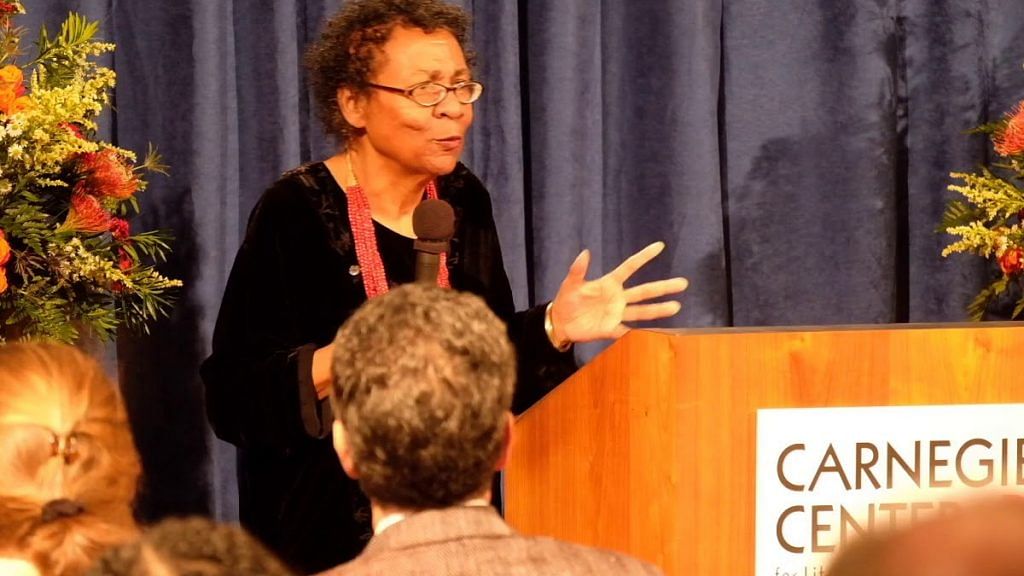bell hooks was a powerful and keen intellectual who brought critical thought into the feminist discourse, particularly during the 1980s. She pushed forward the discourse to understand the intersectionality of race and gender, engaging with the issues concerning African-American women by re-centring their narratives and creating a space for dialogue. This was qualitatively different from the ‘emancipatory approach’ of middle-class white feminists. The death of hooks is saddening, but her legacy of breaking out of conventional gender norms will continue to remain afresh and inspiring.
Where are the women from the margins?
In her classic work Feminist Theory: From Margin to Center, hooks discussed the precise need for an intersectional feminist theory. She argued that if feminism cannot acknowledge the perspective of women from the margins, then it is in vain. Her critical theory emerged from her ability to question the prevalent feminist narrative that lacked wholeness and account of human experiences. Her work was revolutionary and transformative at the same time, emphatically accounting the active presence of women in the political movement and discussing their struggle and resistance.
Why bell hooks was important is because she did not theorise feminism as something that was complex and distant for the marginalised. For her, it was deeply rooted in the grassroots practices of women and how women from the margins engaged and contributed to the movement. She believed in women’s power to reconstruct society and actively alter oppressive structures. hooks emphasised pedagogy that encouraged critical thought and a dialogic engagement between student and teacher. Her theory stemmed from her own experiences when she felt marginalised in the classroom space.
As a believer in practice, hooks strived for theorising the ‘devaluation’ that Black women are subjected to, including their vulnerability in terms of sexual exploitation. The uniqueness of her work was about her strive for seeking sisterhood, solidarity, and dialogism.
Also read: Don’t just cheer removal of Deepa Mohanan’s director. Why was casteist prof hired, promoted?
Dalit-Bahujan women should take cue
The emergence of intersectionality in the West through the writings of theorists such as Kimberle Crenshaw, Patricia Hill Collins, and hooks brought paradigmatic shifts within the feminist discourse. In the Indian context, the intersectionality of caste and gender was taken up in the writings of authors such as Sharmila Rege, Kalpana Kannabiran, Uma Chakravarti, Gail Omvedt, and others. Rege discussed the concept of ‘double marginalisation’ that a Dalit-women faces due to her exclusion as a woman and a Dalit. Similarly, Uma Chakravarti discussed the concept of ‘Brahmanical patriarchy,’ referring to the social structures mentioned in Manusmriti that render Dalit women vulnerable.
Dalit women’s standpoint was significant, as it brought the question of Dalit-Bahujan women at the centre. When one looks into their social position, they see that the women remain much worse off. They are subjected to different forms of violence and humiliation because of their caste. This is reflected in the National Crime Records Bureau (NCRB) statistics, which report 10 daily cases of rapes against Dalit women. This is despite the fact that many such atrocities go unreported.
One needs to appreciate the Dalit women’s standpoint in facilitating public discussions on Dalit women and making it visible as a category within the discourse. Such a distinction can help to produce knowledge systems and introduce the perspective of the marginalised. In the West, the feminist standpoint of African-American women has generated alternative ways of producing and validating knowledge. The emergence of Black feminist epistemology has opened up the possibility of understanding how power relations exist between white men and other social structures dominated by them.
Unlike the African-American discourse in the West, there is still much to be worked on on the Dalit-Bahujan women’s theories in India. There is also a need to re-examine the solidarities between marginalised women across South Asia and talk about their experiences. If one looks into the history of the feminist movement in India, it was largely dominated by privileged, upper-caste women. The movement by Dalit women and their struggle was conveniently ignored and sidelined. The absence of mainstream feminists in the Dalit women’s movement reflects upon the need for a representative from the community. Works like bell hooks’s have overtly emphasised the accounting of the marginalised voices, struggles, and resistance, something that Dalit-Bahujan women need to take inspiration from and develop further upon.
Also read: Hindu scriptures validate the persistence of inequality in caste and gender
Why bell hooks is relevant for feminism in India
bell hooks’s works critically engaged with diverse themes such as education, African-American women, love, and sisterhood. Besides academic engagement, there is a lot to learn from her struggles that formed the basis for the Black feminist discourse. In Ain’t I a Woman?, she mentions her experience in a Women Studies class at Stanford University, where her position on Black women as victims of sexism was rejected. She eventually provided concrete evidence to prove her argument.
Like bell hooks’s experience, the struggle towards the success of Dalit-Bahujan women in academia is no easy path. There is a need to work hard at the level of pedagogy, and Dalit studies should ensure that the voices of Dalit-Bahujan women are adequately represented. To make this possible, there is a need to encourage Dalit-Bahujan women to come forward and voice their struggle.
The writings of bell hooks has opened up the possibility for feminism to engage and recognise the voices from the margins. She considered theorising Black women’s experiences as a ‘location of healing’ and a process of reflecting upon the unheard.
(Edited by Humra Laeeq)
